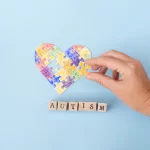From Diagnosis to Adulthood: Navigating the Autism Journey with Your Child
As a parent, finding out that your child has autism can be overwhelming. Autism Spectrum Disorder (ASD) is a neurodevelopmental disorder that affects communication social interaction, and behavior. Navigating the autism journey can be challenging, but with the right resources and support you can help your child reach their full potential. In this article we will explore the autism journey from diagnosis to adulthood and provide helpful tips and resources to assist you in supporting your child.
Understanding Autism Spectrum Disorder (ASD)
ASD is a complex disorder that affects each individual differently. It is characterized by a range of symptoms, including difficulty with social communication restricted interests and repetitive behaviors. Symptoms typically appear before the age of three and can vary in severity.
The Diagnosis Process
Diagnosing ASD can be a long and complicated process. A pediatrician or a developmental pediatrician may be the first medical professional to suspect autism and refer your child for an evaluation. The evaluation may include a combination of tests and assessments including a developmental screening cognitive testing, and a behavioral evaluation.
Early Intervention Services
Early intervention services can significantly improve outcomes for children with ASD. These services can include speech therapy occupational therapy and behavioral therapy. Early intervention services can help your child develop communication skills improve social interactions and reduce problem behaviors.
School-Age Children
Once your child enters school, they will have access to special education services and support. An Individualized Education Plan (IEP) is a legal document that outlines your child’s special education needs and services. It is important to work closely with your child’s teachers and school to ensure that your child receives the appropriate services and accommodations.
Adolescence
Adolescence can be a challenging time for any child, but it can be particularly challenging for children with ASD. Adolescents with ASD may struggle with social relationships self-advocacy, and independence. It is essential to work with your child’s healthcare provider and school to develop a transition plan for their teenage years and beyond.
Adulthood
As your child with ASD enters adulthood, they may face new challenges and opportunities. Many adults with ASD have skills and talents that can contribute to the workforce but they may need additional support to find and maintain employment. It is essential to explore community resources and vocational rehabilitation services to assist your child with ASD in their transition to adulthood.
Resources for Families
Families of children with ASD can benefit from a variety of resources and support services. Parent support groups respite care and family counseling can all help parents navigate the challenges of raising a child with ASD. There are also many online resources and forums that provide information and support to families.
Conclusion:
Raising a child with ASD can be challenging, but with the right resources and support, you can help your child reach their full potential. Understanding the diagnosis process, accessing early intervention services, and developing a transition plan for adulthood are all essential components of the autism journey. Remember that you are not alone and that there are many resources available to support you and your child. By working together, we can help individuals with ASD lead fulfilling and rewarding lives.



